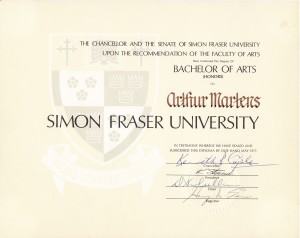In the midst of the accelerating emotions on the part of a number of students against the university administration and the senate, I needed to work hard to get decent marks to qualify for student loans and bursaries. Occasionally, when I began falling behind, I called on Linda for help. One day I brought home several textbooks and said “I have a paper due tomorrow. Can you scan these books and lightly pencil mark any paragraphs that pertain to my subject?” Linda very effectively selected paragraphs with information I wanted. There were no desktop computers and I worked all night on my manual Smith Corona typewriter. At 8 am I drove to the university and handed in the paper.
I needed to discover ways to compensate for my inability to do as much reading as my courses required. Fortunately, a number of my profs based a large percentage of their marks on written papers. I decided to focus on writing papers that were both well researched and well written. Linda helped me as much as she could with the research and my marks on these were predominantly A’s and B’s. In an English course focused on poetry, I memorized parts of a number of poems. An angel must have prepared the final exam with me in mind. The main question required an essay length response. This allowed me to use the portions I had memorized and I quoted extensively from them.
I wasn’t aware of it, but Linda told me later she had become concerned that we were drifting apart. Also, she felt that attending university must be easy compared to working. She decided to take a few courses herself. This had several benefits, one of which was immediate. She quickly realized that university expectations were more rigorous than she had imagined. Also, she enrolled in a PSA course taught by one of the radical American professors, and her thinking was considerably influenced. Our views became more synchronized, and this was good for our relationship.
Our time at SFU had one outcome that, in retrospect, we still somewhat regret. With little money in the bank, we had been able to buy the house and five acres mentioned earlier, and also a couple of lots. Selling the lots had brought us a substantial profit, and we were keen to embark on further endeavours of this kind. The teaching of the PSA professors persuaded us, however, that this type of activity was part of the despised, evil capitalist system. We made a decision to cease these activities and it would be many years before we again got back into real estate. Because we had been out of the market so long, we had fallen behind and could participate only in a limited way.
Our experience during the time of student unrest helped us understand that a small group of committed, highly persuasive individuals can at times shape events because the majority are willing to follow. They may have the power to shape events, but the change they bring will not necessarily be desirable. Student dissatisfaction and clamouring for change persuaded the President of the University to resign. Our rejoicing at this was short lived. We had succeeded in deposing the president, but when a new individual replaced him, we discovered that he was even less understanding or tolerant of student wishes.
Linda and I learned from this that it is important to carefully assess the character, ideas and direction of the people we are following and working with. We respected most of the left leaning student leaders, but in time we came to understand their motivation was based more on ideology, than what was best for the majority of the students. Also, while they had some valid insights into issues facing our society, they had little positive understanding of what needed or could be done.
As happens so often after a crises, university life following the strike pretty much returned to its regular ebb and flow, but without the frequent left wing meetings and rallies. I was able to make up for the time lost during the five week strike and realized that my marks were high enough to attain an Honours BA if I took additional courses for extra credits. I did two substantial research projects. One was on the evolving Mennonite culture in the Abbotsford area. The other was on inmate culture at Matsqui Institution. Both required dozens of interviews and hours of writing.
For Linda and myself, it is still interesting and enlightening to look back at the SFU years. Getting me through university was the first time we collaborated on a significant challenge that required full commitment by both of us. We agree that we learned at least as much outside the classroom as inside. Some of what we learned we have subsequently discarded because it does not serve our purpose. We do value and have retained a great deal though and continue to build on it to this day.


I remember those years vividly. This is a most interesting post and we must discuss this further next time we meet.